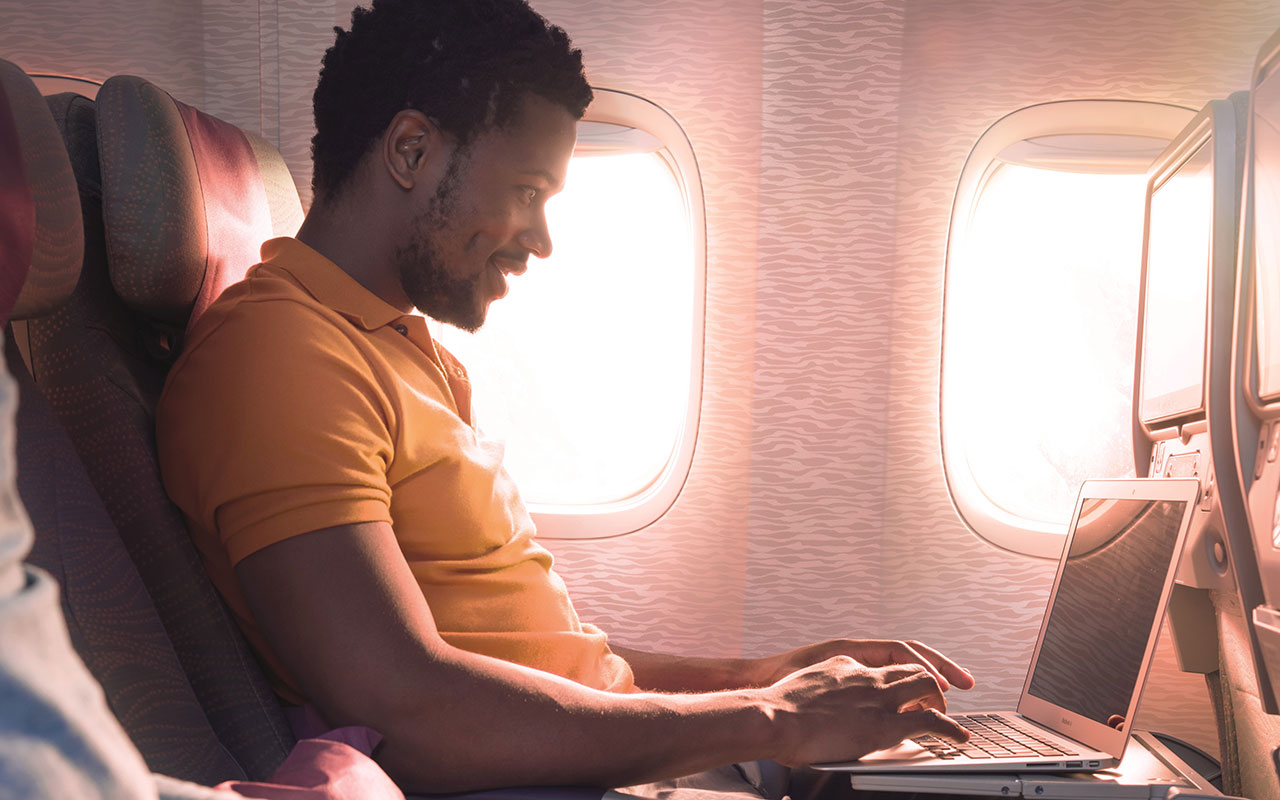Aviation experts share their insights on the future of business travel and how technology could fuel a resurgence in the sector
Business travel will return at a slower pace than VFR (visiting friends and relatives) and leisure travel.
While leisure tourism continues to steadily rebound from the impacts of the coronavirus pandemic – with room rates in the UAE’s luxury hotels at almost pre-pandemic levels and hotels hitting 62 percent occupancy in the first six months of 2021 – business tourism is suffering a different fate.
The repercussions of the drop in business travellers, who contributed to three-quarters of airlines’ pre-pandemic profits while accounting for only 12 percent of seats, according to PwC, can be felt across the entire travel sector.
As businesses continue to take advantage of the ease and cost-effectiveness of virtual conferencing tools, spending on business trips could slide to as low as $1.24 trillion by 2024 from a pre-pandemic peak in 2019 of $1.43trn, according to the Global Business Travel Association.
Companies are finding it increasingly difficult to ask employees to take work trips amidst a continuing global health crisis, while many of their clients and partners have yet to open their doors to their own employees, let alone visitors.
“At the onset of Covid-19, many companies’ offices closed and remote working, supported by online meeting platforms, became the norm,” shared Avtar Jalif, head of transport and logistics at KPMG Lower Gulf.
“Business travel has been – and continues to be – severely impacted. We have seen travel related to family visits and holidays rebound in certain markets, however business travel continues to lag,” he added.
 Avtar Jalif, head of transport and logistics at KPMG Lower Gulf.
Avtar Jalif, head of transport and logistics at KPMG Lower Gulf.
However, a glimmer of hope for the sector’s recovery remains. Conferences and trade shows, which account for a significant volume of business trips, have marked their comeback, in live and hybrid formats. Workers are also flocking back to their offices at full capacity.
“Business travel will return at a slower pace than VFR (visiting friends and relatives) and leisure travel,” shared Linus Bauer, founder and managing director of Bauer Aviation Advisory.
“I personally do not believe in the majority of these scenarios and predictions as the pandemic is actually playing a role in promoting business travel and we should not underestimate that. In the medium-to-long term, people will be on the move more than ever. However, the overall effect will vary from company to company, country to country, and industry to industry.”
 Linus Bauer, founder and managing director of Bauer Aviation Advisory.
Linus Bauer, founder and managing director of Bauer Aviation Advisory.
Digitisation in enabling business travel
Despite the relative success many companies experienced through a year of essential-only travel, face-to-face interactions remain the ultimate preference for businesses and professionals.
While video conferencing platforms, such as Zoom, may replicate much of the experience of an in-person chat, business professionals still believe in the value of human interactions, especially when building client relationships.
“Whilst virtual platforms have successfully enabled corporate meetings, business travel is fuelled by the need to feel and touch products, see and experience things first-hand and attain a competitive edge…What is becoming clear, based on anecdotal evidence from airline-booking patterns, is that people are itching to travel,” said Jalif.
“Human interaction will always remain important – this remains true for business,” he emphasised.
Bauer also believes that digitisation is actually enabling and supporting the corporate travel sector, adding: “Thanks to virtualisation, productivity remains as high at home as it does in the office. Even the time when travelling can be much more productive because you can maintain contact with anyone, anywhere on long-haul flights or a long train.
“In the post pandemic era, we can travel elsewhere and still remain largely at work in a virtual capacity.”
As digital globalisation continues to surge post-pandemic, driving down the cost of cross-border business communications and transactions, Bauer said: “This will lead to a surge in demand for business travel in the upcoming years as professionals look to travel, whether to meet their employees or look after their customers and suppliers.”
 Human interaction will always remain important and this remains true for business.
Human interaction will always remain important and this remains true for business.
In terms of the factors that will help rejuvenate the corporate travel sector post-pandemic, Bauer cited the combination of ‘Zoom fatigue’ and global borders reopening, while Jalif believed that the successful roll out of vaccination programs is also playing a key role.
Jalif added: “Currently, we are not seeing a unified global approach, which may help enormously. Perhaps a step in the right direction, the International Air Transport Association (IATA) is asking governments for clear indications of the benchmarks that they will use to safely give people back their travel freedom.
“These factors, along with companies’ ESG visions, will help shape corporate budgets and travel policies. Those policies may well result in longer duration business trips, rather than the quick shuttle visits.”
Source: Read Full Article


 Avtar Jalif, head of transport and logistics at KPMG Lower Gulf.
Avtar Jalif, head of transport and logistics at KPMG Lower Gulf. Linus Bauer, founder and managing director of Bauer Aviation Advisory.
Linus Bauer, founder and managing director of Bauer Aviation Advisory. Human interaction will always remain important and this remains true for business.
Human interaction will always remain important and this remains true for business.